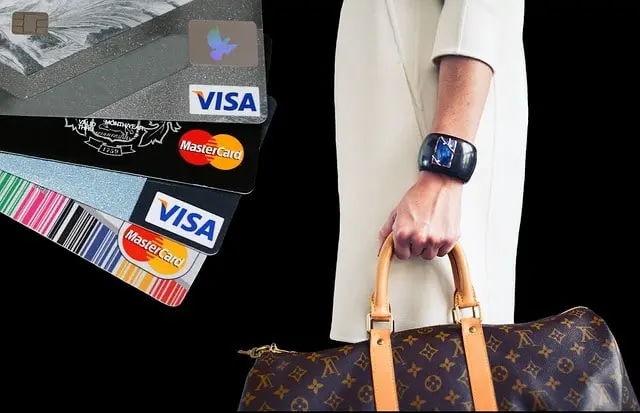Credit Card Travel Hacking – Is the Payout Worth the Investment?

Travel Hacking with Credit Cards — Is the Payout Worth the Investment?
Many people wish they could travel more often, but the cost of flying and other travel expenses can be prohibitive. But what if you could find a way to earn flights, lodging, and other upgrades for free? Well, you (sort of) can with credit card travel hacking.

“Travel hacking” is basically a way consumers can game and maximize credit card rewards. An experienced travel hacker would open up several travel credit cards, spend up to a certain limit, and then cash in on rewards points/miles accrued up to that point. Those miles can be used for discounted airfare, hotel stays, and other general expenses during travel.
It can be a rewarding tactic, but it’s also a risky endeavor. Let’s learn more about travel hacking before we talk about the risks and rewards and whether it’s all worth it.
What Is “Travel Hacking” in the First Place?
Before discussing how to hack, you need to know what to look for in a credit card. You need to open up a credit card that has a rewards or miles program, meaning it offers points/miles on an airline you hope to fly on, for spending with the card. Secondly and more importantly, the card must have a signup bonus which is a block of points, miles, or cash offered for spending a certain amount of money in the first few months of having the card. The credit card hacking procedure relies on this cash bonus.
As for the procedure, it can be tricky to explain for multiple cards, but breaking down the process with a single card is very easy to understand. Here’s an example:
To start, you open up a new rewards or travel rewards credit card. The next step is to spend up to a certain threshold with the card within the allowed time to earn the signup bonus. Most cards set their bonus for amounts charged in the first three months. For example, a card may offer 50,000 bonus miles (or $500) for spending $3,000 within 3 months of opening up the card. On top of this, your credit cards ideally should accrue standard miles and points for everyday expenses and not just for purchasing airline travel.
With one card, you have accrued $500 in rewards that can be put towards travel expenses or airfare. Across multiple credit cards, this can amount to a substantial amount of rewards and cash bonuses.
Don’t forget about your credit card debt though. After you reach the spending threshold, the next order of business is to pay off the debt or transfer it to a low-rate credit card. Either way, do not forget about paying off your debt. Also be aware that cards that earn the most points often have a substantial fee after the first year. You should decide carefully whether you wish to let the card renew and pay the fee, or pay the card balance in full and close the card before its first anniversary.
Why Is Travel Hacking Enticing?
Travel hacking is appealing for several reasons. At face value, it’s like a game where you can earn free money. Who wouldn’t want a bonus $500? Everyone likes free money, but that isn’t the even best reason.
Travel reward miles offer greater value when used for airfare or qualified travel expenses. Many credit card providers offer a better deal to cardholders when they put miles towards traveling costs. For example, a block of 50,000 miles is worth $500, but those 50k points may cover up to $625 in airfare. Some card providers offer 25% more value on miles used for airfare. So, the added mile redemption value is one enticing aspect.
You may not be convinced yet. By itself, travel hacking may seem like an absurd idea because you may spend up to $3,000 to $5,000 for $500 or less in rewards. However, hacking credit cards can actually be a savvy way to take advantage future expected expenses.
For instance, let’s say you are painting the outside of your house and know it’s going to cost $6,000. You can use this planned expense in your travel hacking strategy. If you open up a new credit card with a bonus offer for spending $5,000 in 3 months, you can hit that bonus offer easily with one expenditure and collect the rewards.
This is different than spending frivolously just for a bonus offer. You would have spent this money anyway. It’s much easier to view those points and miles as free money when they are earned for planned or required expenses.
Why Should You Think Twice?
Of course, travel hacking is a risky game – in more than one way. The main requirement for travel hacking is spending on credit. For obvious reasons, this can cause multiple problems if you spend uncontrollably and cannot pay the credit card balance. You will end up paying interest fees on your balance which could amount to more than the amount you receive in travel credit.
Additionally, spending money with credit cards will accrue debt to your name, and this debt must be paid back, and often with interest. If you spend too much, then there’s no guarantee that you can pay it back. If you miss credit card payments, then your credit score may suffer. Your savings could be drained from the expenses.
Aside from missing payments, too much credit card debt can hurt your credit it other ways as well. Using the majority of your credit limit (also known as a high credit utilization ratio) is a negative credit factor. Furthermore, high debt compared to income results in a high debt-to-income ratio (DTI) which is also a negative factor.
Finally, frequently opening numerous credit cards may result in multiple hard credit inquires. Each hard inquiry will drop your score a few points. Across multiple cards, this could result in a significant drop in credit score.
Think About the Return on Investment
So when is travel hacking a good idea? In general, it’s a good idea when you can use the card strategically without going overboard. Regardless, you have to invest money, so think about what you’re getting out of it.
Travel hacking can be a terrible idea if done wrong. Arbitrarily spending money on things you don’t need just to earn travel rewards is never a good idea. Why spend $5,000 on credit to get a $500 cash bonus if you could just save that $5,000 for the actual trip? Spending frivolously and calling it credit card hacking is not savvy – it’s more like a misguided investment.
However, credit card hacking can be very useful if you’re already planning some large expenditures that you have saved for, and you have plans to travel in the near future. You can use the reward program to get money back from your expenses. That money can be put towards travel, or it can be used to pay off your bill. You either get a travel discount or a discount on your planned expenses. It becomes a good investment either way.
Before trying it out, ask yourself what you need the bonus points for and what you plan on buying to get the rewards bonus. Think about the impact this will have on your overall finances. These are important considerations to make before trying your hand at credit card hacking.
***********************************
About The Author: Andrew is a Content Associate for Lendedu – a website that helps traveling consumers with their finances. When he’s not working, you can find Andrew hiking in the mountains or chilling with his cat Colby.
***********************************
Image Source: Pixabay.com




